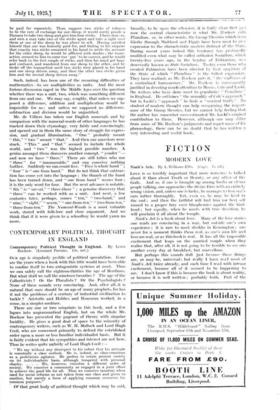CONTEMPORARY POLITICAL THOUGHT IN ENGLAND
OUR age is singularly prolific of political speculation. Gone are the years when a book with this title would have been able
to confine itself to two antagonistic systems at most. Thus we can safely call the eighteen-thirties the age of Bentham. But what shall we call the nineteen-twenties ? The age of the Collectivists ? Or the Pluralists ? Or the Psychologists ?
None of these sounds very convincing. And, after all, it is natural that ours should be an age of many prophets, for has it not the problems.of a century of industrial civilization to tackle ? Aristotle and Hobbes and Rousseau worked, in a
sense, in a simpler medium.
There are one or two misprints in this book, and a few lapses into ungrammatical English, but on the whole Mr. Rockow has presented the pageant of theory with singular lucidity. He gives a good deal of space to the minority of contemporary writers, such as W. H. Mallock and Lord Hugh Cecil, who are concerned primarily to defend the established order upon a more or less familiar individualist basis. But it is fairly evident that his sympathies,and interest arc not here.
Thus he writes quite unfairly of Lord Hugh Cecil :-
" We say without any disrespect to his talent that his attitude is essentially a class outlook. He is, indeed, as class-conseibus as a proletarian agitator. He prefers to retain present society on its individualistic basis, although tempered with personal charity. . . . We, however, visualize a different order of society. We conceive a community as engaged in a joint effort to achieve the good life for all. Thus we conceive taxation when used for social reforms as not taken from one class and given to another, but merely a form of applying common resources for common purposes."
Of that great body of political thought which may be said, broadly, to he upon the offensive, it is fairly clear that just now the central characteristic is what Mr. Roekow calls Pluralism, or, in other words, the Group Theories which from Gierke through Maitland and Figgis have been used to give expression to the characteristic modem distrust of the State. During recent years indeed this tendency has profoundly modified even what may be called orthodox Socialism, which twenty-five years ago, in the heyday of Fabianism, wns deservedly known as State Socialism. To-day even those who created Fabianism have been affected by that suspicion of the State of Which " Pluralism is the fullest expression. They have realized, as Mr. liockow puts it, " the stulliness of a centralized bureaucracy." Mr. Rockow is consequently justified in devoting Much attention to Messm Cole and Laski. the writers- who have done most to popularize " Pluralism " in England. He criticizes " the unreality of Cole's approach." but in Laski's " approach '' he finds a "seminal truth." No student of modern thought can help recognizing the import- ance of the Group theories, but we cannot help feeling that the author has somewhat over-estimated Mr. Laski's Original contribution to them. However, although one may differ from some of Mr. Rockow's judgments and regret some of his phraseology, there can be no doubt that he has written a very interesting and useful book.


























































 Previous page
Previous page